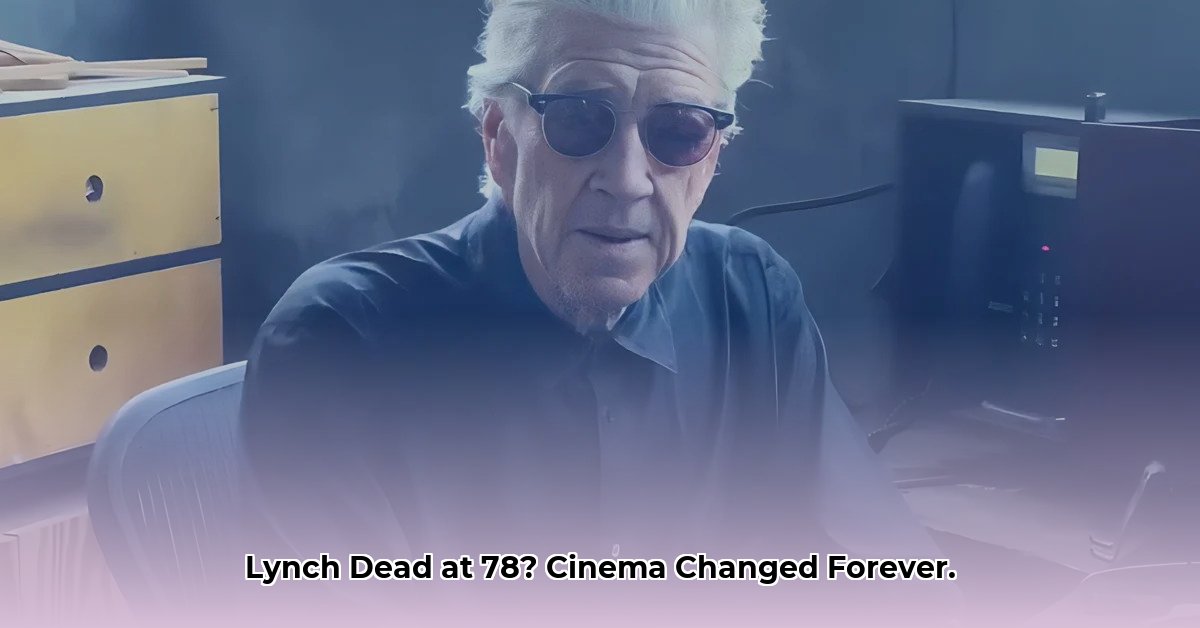The world of cinema mourns the passing of David Lynch, a true visionary who left this realm on January 16, 2025, at the age of 78. His departure, due to emphysema, leaves a void as perplexing and unsettling as the dreamlike landscapes he so masterfully crafted. Lynch’s legacy is one of enduring innovation, a testament to a singular artist who dared to explore the shadowy corners of the human psyche.
From Missoula to Mulholland: A Life Less Ordinary
Early Years and Artistic Genesis
Born in 1946 in Missoula, Montana, Lynch’s early life was a nomadic tapestry woven across the American landscape. This constant shifting of scenery likely shaped his unique perspective, fostering a fascination with the uncanny that would later permeate his work. His initial artistic pursuits in painting laid the groundwork for his transition to cinema, a medium where he could fully unleash the power of his surrealist visions. This exploration began with experimental shorts like Six Men Getting Sick (1966), The Alphabet (1968), and The Grandmother (1970), each hinting at the thematic and visual language that would define his later masterpieces.
Link to David Lynch’s biography
The Birth of a Nightmare: Eraserhead and the AFI Years
Eraserhead (1977), Lynch’s debut feature film, emerged from the industrial grit of Philadelphia and the hallowed halls of the AFI Conservatory. This nightmarish exploration of parenthood, with its deformed infant and unsettling soundscapes, became an instant cult classic. Jack Nance’s haunting performance as Henry Spencer solidified the film’s status as a midnight movie staple. The film’s prolonged production, due in part to the AFI’s underestimation of its complexity, allowed Lynch to refine his distinct style, a blend of surrealism and psychological horror.
Link to Eraserhead analysis
A Cinematic Dream Weaver: Lynch’s Enduring Legacy
Navigating the Lynchian Labyrinth: Key Films and Their Impact
Lynch’s filmography is a dreamlike odyssey, a collection of fragmented narratives and unforgettable imagery. The Elephant Man (1980), while more conventional in structure, demonstrated his ability to navigate mainstream storytelling without sacrificing his artistic vision. His collaboration with composer Angelo Badalamenti, beginning with this film, added another layer to the Lynchian atmosphere, a haunting blend of melody and dissonance. Blue Velvet (1986) peeled back the veneer of suburban America, revealing the darkness simmering beneath. Wild at Heart (1990), winner of the Palme d’Or, further solidified his reputation as a master of the bizarre. Mulholland Drive (2001), a mesmerizing puzzle box of Hollywood illusions, earned Lynch an Oscar nomination for Best Director.
Link to analysis of Mulholland Drive
Twin Peaks: A Television Revolution
Twin Peaks (1990-1991, 2017) transcended the boundaries of television, becoming a cultural phenomenon. This genre-bending masterpiece, co-created with Mark Frost, blended soap opera, murder mystery, and surrealism into a captivating brew. The show’s serialized format, complex characters, and haunting atmosphere paved the way for the era of prestige television. The revival series, Twin Peaks: The Return (2017), served as a final act of creative defiance, solidifying Lynch’s status as a visionary.
Link to Twin Peaks retrospective
Beyond the Screen: A Multifaceted Artist
Lynch’s creativity extended beyond filmmaking. His paintings, music compositions, and even furniture designs reflect his unique aesthetic and philosophical inquiries. His practice of Transcendental Meditation suggests a deep fascination with the inner workings of the mind, offering a possible key to understanding the dreamlike quality of his work. The David Lynch Foundation, established to promote the benefits of Transcendental Meditation, further highlights his commitment to exploring consciousness and its potential.
Link to David Lynch Foundation
The Enduring Enigma: Lynch’s Influence and Unanswered Questions
David Lynch challenged cinematic conventions, inviting audiences to become active participants in deciphering his enigmatic narratives. His influence on contemporary filmmakers, like Christopher Nolan and Guillermo del Toro, is undeniable. He expanded the possibilities of cinematic storytelling, blurring the lines between dreams and reality, and leaving behind a body of work that continues to inspire and provoke.
While Lynch may be gone, his work remains, a collection of cinematic riddles waiting to be solved. His legacy is not just about the films he made but about the way he changed how we perceive art, dreams, and the very fabric of reality. He reminds us that the most profound truths often lie hidden beneath the surface, waiting to be unearthed through the power of imagination and a touch of the surreal. The world is undoubtedly a little less strange without him, but his art ensures that the dream continues.







